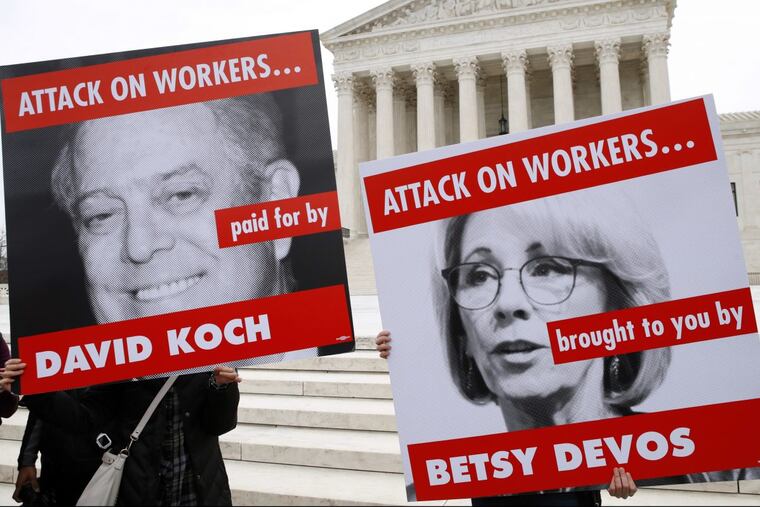The Kochs are trying to kill unions. Be careful what you wish for | Opinion
For years, the right-wing billionaires have been bankrolling the effort to kill public-sector unions, and on Monday, when the fruits of their labors - Janus v. AFSCME - came before the Supreme Court, the brothers were front and center: The anti-union demonstrators outside the Supreme Court held signs prominently displaying the emblem of the Koch-funded group Americans for Prosperity.

Charles and David Koch, be careful what you wish for.
For years, the right-wing billionaires have been bankrolling the effort to kill public-sector unions, and on Monday, when the fruits of their labors — Janus v. AFSCME — came before the Supreme Court, the brothers were front and center: The anti-union demonstrators outside the Supreme Court held signs prominently displaying the emblem of the Koch-funded group Americans for Prosperity.
The Kochs are getting their money's worth. The Trump administration joined the cause, and the five conservatives on the Supreme Court are widely expected to jettison a half-century of precedent. But before those justices pick up pens to sign organized labor's death warrant, perhaps they'll pause to consider, as AFSCME attorney David Frederick warned at the end of arguments Monday, that they will "raise an untold specter of labor unrest throughout the country."
In the decades since the court's 1977 Abood decision, there has been a relative truce in public-sector labor relations: Unions receive "agency fees" from nonmembers for collective bargaining and other nonpolitical activities, and such unions have generally not gone on strike.
Now the Kochs propose to abolish agency fees, saying they violate workers' free-speech rights. But to come to that conclusion requires the justices to declare that basically everything public-sector unions do is covered by the First Amendment — a massive and destabilizing change.
>> Read more: Pennsylvania needs more unions: Janus hurts everyone | Opinion
The conservative justices, who speak piously about judicial restraint, could blow up decades of labor-law precedent, while radically reinterpreting the First Amendment. They would do this even though it contradicts what the court unanimously affirmed only a decade ago and even though in this case they have no factual "record" of what the consequences would be — only a desired outcome.
I noticed Monday morning that, since my last visit to the court, rodent glue traps had been placed outside doors to the Supreme Court chamber. I'm not the only one who smells a rat.
Justice Stephen Breyer inquired whether lawyers for Janus would, after jettisoning the Abood precedent, "apply modern frameworks to all old cases, beginning with Marbury v. Madison" from 1803.
Justice Elena Kagan noted that the court would be overturning statutes of 23 states and invalidating labor contracts of thousands of municipalities covering perhaps 10 million workers. "When have we ever done something like that?"
This is radicalism, not conservatism. But it doesn't matter, because there are probably five votes against unions, derided by Justice Anthony Kennedy as advocates "for massive government, for increasing bonded indebtedness, for increasing taxes." And any justification will do. Justice Samuel Alito compared workers forced to pay agency fees to Thomas More, killed for refusing to recognize King Henry VIII as head of the church.
The Kochs, and the justices, may be haunted by what they unleash. When unions' backs are to the wall, they become more militant and look for quick wins. Beyond that, killing agency fees on free-speech grounds could give workers free-speech protection to complain publicly about employers. Former Reagan administration solicitor general Charles Fried warned in an amicus brief that the court risks setting in motion "drastic changes in First Amendment doctrine that essentially threaten to constitutionalize every workplace dispute."
Among the potential responses already being contemplated by labor: seeking to overturn laws such as Wisconsin's limiting what unions can ask for in bargaining; challenging laws that make public-sector bargaining illegal for some; and allowing workers to opt out of paying for pension-fund and municipal lobbying.
"The ruling could both wildly increase workers' bargaining power and clog the lower courts with First Amendment challenges to routine uses of taxpayer money," Shaun Richman, a former organizing director for the American Federation of Teachers, wrote in In These Times.
And the chaos won't be limited to labor law. Among the other things that might be challenged if government-imposed payments become unconstitutional "compelled speech": bar dues, student-association fees, utility bills, auto-insurance premiums, continuing-education requirements for doctors and other professionals, homeowners association dues, training for school-bus drivers and others, vaccinations, attorney-supervised real estate closings.
And perhaps people will decide that they have a free-speech reason not to pay taxes, because it compels them to support the military, or public universities. After all, the message on those Koch-brothers signs at the court Monday was sweeping: "No one should be forced to fund causes they don't believe in."
The justices can ignore precedent and reinterpret the Constitution. But they can't invalidate the Law of Unintended Consequences.
Dana Milbank writes about political theater in the nation's capital. He joined the Post as a political reporter in 2000. @Milbank